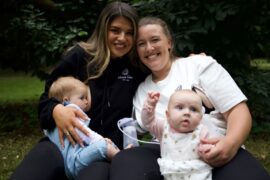At Tamba Wildflower, they believe that each individual act of kindness ripples far and wide to impact more lives than we will ever meet, so they throw out as much kindness as they can in all they do. They work hard to improve the social and economic standing of as many families in India as they can by supporting micro industry. They feel guided to make a tangible and meaningful impact in all the lives they touch with their products, services, and practices, whether that be connection to spiritual practice, connection to ourselves, or connection to others. They offer bespoke guided tours to India, private and online yoga classes and beautifully handcrafted Fair Trade fine jewellery. Chief Visionary Officer Tash Adams talks to The Natural Parent Magazine about the inspiration behind Tamba Wildflower, the breakthroughs they have made along the way, and their hopes and dreams for the future.
The passion: What inspired you to set up your business?
I’m on a lifelong journey of self-discovery, joy, connection and purpose. Having a daily Yoga and Buddhist practice, I was pulled to take my first trip to India to visit the new home of the Dalai Lama in Dharamsala and deepen my Yoga practice. What I didn’t expect to find was a feeling of ‘coming home’ the moment I stepped off the plane. This led me to endless adventures and friendships across the land where ‘guest is god’. I certainly didn’t expect to turn my life on its head to align my ‘work’ with my ‘passions’, but that’s exactly how my journey unfolded.

The launch: How did you start out in the beginning?
I started my business with TW Travel to design unique India tours for travellers who like the flexibility of tours that align to their interests rather than ‘out of the box’ experiences, along with the freedom of solo or small group travel, but, with the support of a travel escort, team and guide to support them in their adventures. I love solo and small group travel because you have the framework for a great experience, but with the flexibility to make changes along the way and the time to create real connections with the country and culture.
When I was originally travelling on my own to and from India, most people I met would say that they’d love to go but felt nervous travelling alone, and equally did not like big group tours. Both my Australian and Indian Travel Agents agreed that this was the common barrier for people travelling and suggested I consider escorting their clients, and so, the business was launched in humble beginnings.
Wildflower Yoga was almost a natural evolution for my business. I originally studied Yoga Teaching to deepen my own practice, but also to feel competent sharing my practice with clients when travelling in India. Often, clients would like to join me in my practice, and felt naturally inspired to practise whilst in India.
Offering private and online classes actually began in response to the pandemic. It was lovely to be able to have an offering during the periods of isolation and it has continued as we open up. Whilst Yoga is not a primary ‘part of the business’ it is the practice that guides me through every day, and in turn, every aspect of the business. It’s my source of connection to the universe, to the joy of life, and to my personal practice of devotion, so to build my business on these principles has meant the world to me.

The innovation: What was the biggest breakthrough for you with your business?
Tamba Retail is the third and most unexpected, yet most adored, part of our group. Whilst I love sparkly adornment and certain fashion as much as the next person (don’t get me started on my sneaky earring obsession), the vision for Tamba Retail grew from a much different intention. On my journeys to India, meeting and connecting with families, I found myself offering to fund the education costs of girls from struggling families. Whilst their families work terribly hard to support them, and could often afford the education for one child, their second (or further) children would either miss out or attend a less superior school until they were old enough to work. The question of who they send to school becomes a very practical and real dilemma they have to address. Often, this means that girls miss out. If love alone for their daughter could lift them up and create the best future possible, their dreams would be realised. But this isn’t the reality for many.
What I realised quickly is that whilst I can change the lives of a few by supporting them, I had to ask myself what a more sustainable, effective and far-reaching solution would be. So, I got busy researching and got on the ground to meet with Not For Profit Groups to find the answer, and the message was clear. Pay families a living wage, invest in their community infrastructure, and people will invest in their children’s future themselves. Basic needs have to be met first- sanitation, food, health – but once these are met, people can invest in education.
First I needed to find work for people that I could pay them a living wage for, and then I needed to work with Not For Profit Groups that are passionate about Fair Trade, investing in the basic infrastructure of communities, and lifting people up through business support and education. And I found them. I love the partnerships I have with SETU and Sasha in India. They do just this. They train and support artisans to grow their skills, help them with machinery and tools, link them with designers and wholesalers around the world, and then spend time in their communities building sanitation, medical care, and anything else they need to succeed. SETU even supply buses to help kids get to school.











